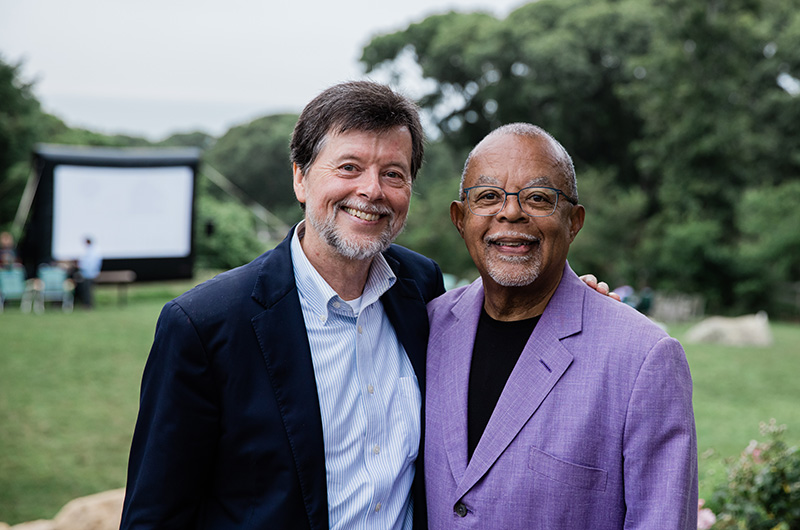In September the general public gets to enjoy a four-part documentary series on Muhammad Ali, created by Ken Burns. Vineyard audiences, however, have already been treated to a preview.
On Tuesday evening at the Beach Plum Inn in Chilmark, the Martha’s Vineyard Film Festival presented an outdoor screening of excerpts from the upcoming PBS docuseries. The sold-out crowd also enjoyed a freewheeling conversation with the creators of the film, moderated by Henry Louis Gates Jr.
“This is the first time anybody outside of our crew has seen this film — certainly the first time anybody has seen it on a big screen,” said Mr. Burns, who directed the series with Sarah Burns, his daughter, and David McMahon.
Mr. Gates told the crowd he has already previewed the documentary in its eight-hour entirety.
“It’s riveting. I didn’t want it to end,” Mr. Gates said.
“We wouldn’t be here if Ali weren’t the greatest boxer in the history of boxing,” he added.
What made the confident, magnetic, often baffling fighter and activist “the greatest” — not only in his own frequently-stated estimation, but in the world’s — is at the heart of the series, titled simply Muhammad Ali.
“We made this film because we are drawn to one of the most remarkable people we’ve ever come across,” Mr. Burns told the Island audience.
The documentary traces the heavyweight champion’s life and career from childhood in segregated Louisville, Ky. to the pinnacle of super-stardom and beyond: his fall through the depths of disgrace as a conscientious objector to the Vietnam War; the stunning Supreme Court turnaround that vindicated him; his complex relationships with Elijah Muhammad and Malcolm X and his equally intricate dealings with the many women in his life — including two wives under the same roof.
“A harem atmosphere pervades in his camp,” Mr. Burns said.
Ali was also breathtakingly cruel, verbally, to his opponent Joe Frazier, who never forgave him, Mr. Burns said. But the filmmakers steer clear of moral and character judgments, retaining their focus on Ali’s life story as a whole.
“We’re in the narrative business,” Mr. Burns said, before recalling something the trumpeter Wynton Marsalis told him during the making of the 2001 miniseries Jazz.
“Wynton said to me, ‘Sometimes a thing and the opposite of a thing are true at the same time, and if you can hold that, you can get along with just about anybody on Earth.’”
When he was not being reviled for opposing the war due to his faith, Ali maintained a deep bond with his adoring public. In one touching contemporary interview, accompanied by clips of Ali holding his baby daughter in his arms amid throngs of fans, now-grown Hana Ali recalls feeling the clapping and cheers that resonated through his chest and into her tiny body.
Another profound moment comes with Ali’s surprise appearance at the 1996 Atlanta Olympics, when he lit the Olympic torch while shaking with Parkinson’s disease.
While the filmmakers admitted to not being boxing enthusiasts before starting work on the series, the documentary excels in showing what set Ali so far apart from his peers in the ring.
“I am still not a boxing fan, although I am certainly a Muhammad Ali fan,” Ms. Burns said.
Retired boxer Michael Bentt serves as an expressive guide to Ali’s distinctive fighting style: the lacerating speed, the relentless charges, the sudden dancing-backward that left opponents fighting the air.
“Each of these fights is fascinating for all of its contents,” Ms. Burns said, noting Ali’s genius for packaging his fights as epic events: The Thrilla in Manila, The Rumble in the Jungle.
“He creates a story around each fight,” she said.
“A story that rhymes!” Mr. Gates added.
The documentary team also makes good use of several sports reporters who covered Ali in his heyday and still relish their memories of his most audacious moves.
“It becomes the bull and the matador,” sportswriter Jerry Izenberg recalls of the 1964 fight in which Ali, a 7-1 underdog still named Cassius Clay, defeated world heavyweight champion Sonny Liston.
Other interview subjects who help round out the documentarians’ portrait of their complicated subject include author Walter Mosley, journalist David Remnick and former boxer Larry Holmes.
“I loved being around Muhammad Ali,” Mr. Holmes tells the camera, while Mr. Remnick recalls the boxer’s polarizing effect.
“People hated him,” said Mr. Remnick, adding that others, like Mr. Remnick himself, loved Ali.
“Either way, you had an opinion,” Mr. Remnick says.
Tuesday’s screening was part of another summer under the stars for the Martha’s Vineyard Film Festival, which continues the pay-what-you-can model at the drive-in theatre it established last summer, in partnership with the YMCA.
Upcoming films this week at the drive-in include Inside Out on July 16, In the Heights July 17 and Raiders of the Lost Ark July 21.
Full listings of upcoming events are posted on the film festival website at tmvff.org.





Comments (2)
Comments
Comment policy »